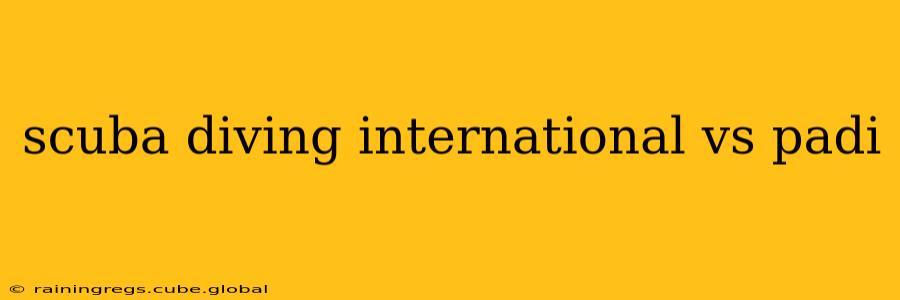Choosing your first scuba diving certification agency can feel overwhelming. Two of the most popular choices are PADI (Professional Association of Diving Instructors) and SDI (Scuba Diving International). Both offer high-quality training and certifications recognized worldwide, but there are key differences that might make one a better fit for you than the other. This comprehensive guide will delve into the nuances of each organization, helping you make an informed decision.
What is PADI?
PADI is the world's largest scuba diving training organization, boasting a massive global network of dive centers and instructors. Its ubiquity means you'll likely find a PADI course wherever you are in the world, and the recognition of your PADI certification is virtually universal. PADI offers a wide range of courses, from beginner open water certifications to highly specialized technical diving programs. Their training materials are generally considered well-structured and easy to follow, making them popular with both beginners and experienced divers.
What is SDI?
SDI, while smaller than PADI, maintains a strong reputation for quality training and a focus on technical diving. They are known for their rigorous standards and a slightly more technical approach to instruction. Although their global presence isn't as extensive as PADI's, SDI certifications are widely recognized and accepted internationally. Many SDI instructors also hold certifications with other agencies, further broadening the scope of their expertise.
SDI vs. PADI: Key Differences
While both agencies provide pathways to become a certified diver, some key differences exist:
Global Reach and Instructor Availability:
- PADI: Has a significantly larger global presence, meaning you'll find more PADI dive centers and instructors worldwide. This is especially beneficial for divers who travel frequently or plan to dive in remote locations.
- SDI: Has a smaller, yet still substantial, international network. Finding an SDI instructor might require a bit more searching in certain areas, but their certifications are still globally recognized.
Training Approach and Curriculum:
- PADI: Emphasizes a more recreational and accessible approach to diving. Their courses are generally well-structured, user-friendly, and cater to a broad range of skill levels.
- SDI: Often incorporates a slightly more technical and in-depth approach to training. While still suitable for beginners, their curriculum might delve deeper into specific diving principles and skills.
Cost:
- PADI: Course prices can vary significantly depending on location and dive center, but generally fall within the average range for scuba diving certifications.
- SDI: Generally, SDI courses are competitively priced, often comparable to or slightly less expensive than PADI courses in the same location.
Specialization and Technical Diving:
- PADI: Offers a wide variety of specialty courses, including wreck diving, night diving, and underwater photography, as well as technical diving programs.
- SDI: Known for its strong emphasis on technical diving and offers a comprehensive range of technical certifications, often considered highly regarded within the technical diving community.
Which Agency is Right for You?
The "best" agency depends entirely on your individual needs and preferences.
-
Choose PADI if: You prioritize a large global network of instructors and dive centers, prefer a more recreational and accessible training approach, and value ease of access to courses worldwide.
-
Choose SDI if: You are interested in a potentially more technical approach to diving, value a strong emphasis on safety and detailed instruction, and are comfortable with a slightly smaller global network.
What are the pros and cons of each agency?
PADI Pros: Wide global recognition, large instructor network, extensive course selection, user-friendly materials.
PADI Cons: Can be more expensive in some locations, potentially less focus on technical aspects for certain courses.
SDI Pros: Competitive pricing, often a more technical approach to instruction, strong reputation within the technical diving community.
SDI Cons: Smaller global network compared to PADI, might require more searching to find instructors in some areas.
Ultimately, both PADI and SDI provide excellent scuba diving certifications. The best choice depends on your personal diving goals and preferences. It's always recommended to research local dive centers and instructors, regardless of the agency, to ensure a positive and safe learning experience.
